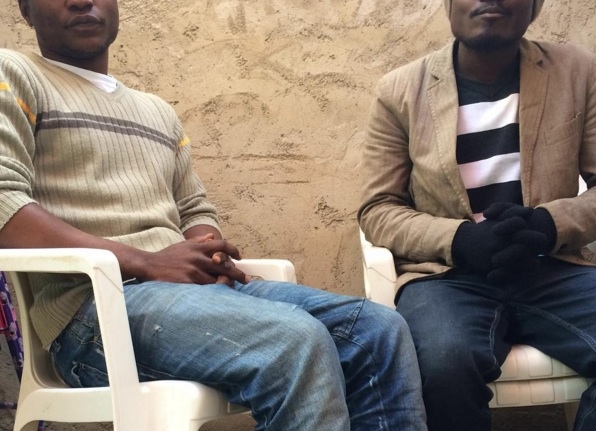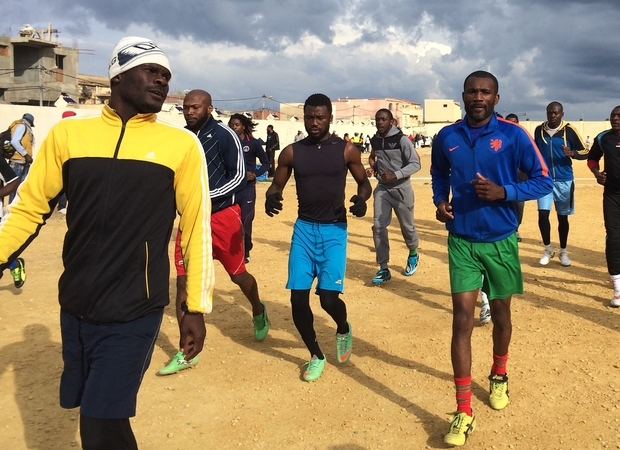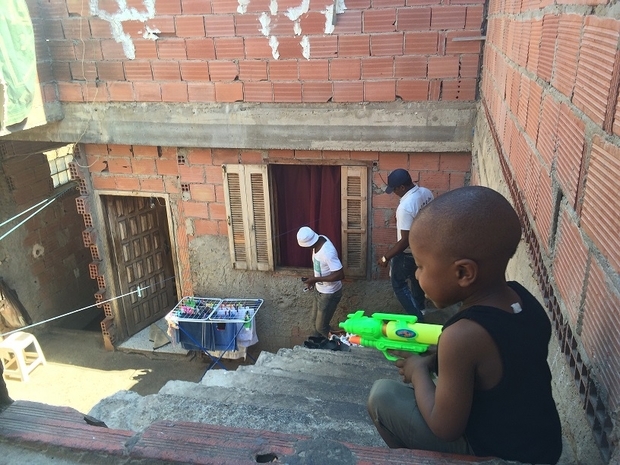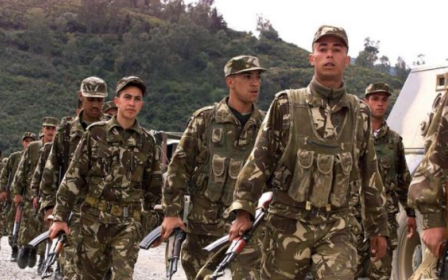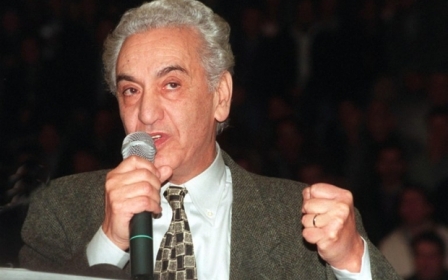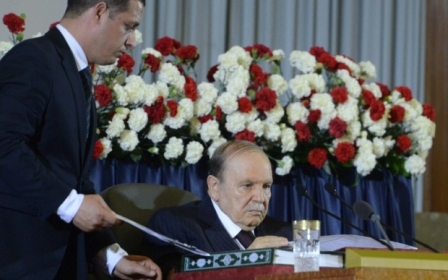Migrants in Algeria struggle for acceptance
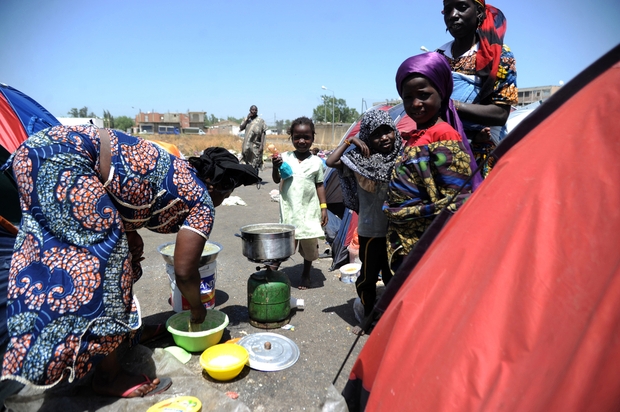
ALGIERS - Marie-Simone is a Cameroonian migrant who was raped by eight people in Oran, Algeria's second largest city. To add insult to injury she was then kicked out of several medical centres when she went for help and treatment following the incident and was even threatened by one of her aggressors after she filed a complaint. Her tragic story was widely reported and swept social media in October. Even after that, she was assaulted again in December.
“She doesn’t want to go out anymore, which means she doesn’t attend her therapy sessions,” Leila Beratto, Radio France Internationale correspondent in Algeria, told Middle East Eye. For more than two years, Beratto has travelled around Algeria with a photographer, collecting migrants’ testimonies.
The two journalists have earned the trust of Cameroonians, Ivorians and Nigerians living in limbo, sharing the same grubby daily life.
“We’re far from realising what they are actually going through, especially women. Last month, when Maggie, a Cameroonian migrant who was raped in Oran, went to the police to file a complaint, she ended up being incarcerated for illegal immigration,” explained Beratto.
On 18 December, to mark International Migrants Day, several associations and NGOs launched the “Algerian Immigration Platform” to facilitate discussions and actions for migrants’ rights. This new collective has determined that Algeria lags far behind in terms of legal protection for victims, fighting against discrimination, and tackling exploitation in the workplace, as well as establishing new laws that protect people seeking asylum.
“In 2004, Algeria ratified the International Convention for the Protection of Migrants. This convention makes no distinction between legal and illegal migrants. They also ratified the Geneva Convention regarding asylum seekers and refugees, when in fact Algeria is not even allowed to grant refugee status since it is the United Nations High Commissioner for Refugees that holds that authority,” said Imene Benchaouche, spokesperson and advocacy officer for the platform with Medecins du Monde (MDM).
This is an important lapse, “especially if we keep in mind Algeria's international commitments,” she added.
For Medecins du Monde, its very establishment shows that migration is no longer a “taboo” topic. However, it is still very difficult to access relevant statistics on Algeria's migrant population. According to a MDM survey, in 2012, there were between 8,000 and 10,000 sub-Saharan people in the northern cities, mainly Malians and Nigerians who come legally, and traditionally only for seasonal works (during the dry season between October to June, they would come up to Algeria for work and then go back to their countries at the beginning of summer to cultivate their lands).
“Since the authorities decided to suspend the expulsions because of the war in northern Mali and the chaos in Libya, and because the borders between the two countries have been closed, we do believe that there are many more of them [Malians and Nigerians],” according to the survey.
Regardless of the debates of whether more migrants are entering Algeria, they have certainly become more visible. “Nigerians who are begging in the streets with their kids have, in a way, served the migrants cause. We can see them now. We can no longer pretend they don’t exist,” explained an activist to MEE.
No refugee camps in Algeria
On 24 November, in Ouargla, near a stop along the migration route between Tamanrasset (in the south) and northern Algeria, a fire in a migrants "camp" killed 18 people and injured 50 others. The camp, however, was in fact a warehouse where the migrants were housed to prevent them from wandering around the streets during Prime Minister Abdelmalek Sellal’s visit during the presidential campaign in 2014.
“With the help of a local who gave them cement, migrants were able to build showers,” remembers Beratto. “Three showers for 600 people! The only thing the authorities provided was a water tank and two dumpsters for garbage. Which was only collected once a week.”
Officially, Algeria refuses to open migrants’ camps. In 2004, former head of diplomacy, Abdelaziz Belkhadem, stated he was “against” the EU proposition to open transit camps in North Africa.
When Federica Mogherini, representative of the EU for foreign affairs, visited Algiers last September, the current Algerian foreign affairs minister, Ramtane Lamamra, referred to the Algerian policies on the matter which has not changed since the time of Boumediene (the second president of Algeria from 1964 to 1979): helping to develop the countries from where the migrants come. “We need to give hope to the people, to give them work, to maintain their dignity, and to help their governments to solve their political issues in the the long term,” he insisted.
“In Algeria, we don’t say ‘camp’ but ‘asylum centres’,” said Faten Hayed ironically. She is a journalist who created a Facebook page dedicated to the migrants’ news: "Bienvenue chez moi" (Welcome to my place). She explained to MEE that those centres, run by the Red Crescent, which seems like an extension of the authorities to many, look more like “an impenetrable fortress”.
“We know for sure that there is one located near Tin Zaouatine (500km further south from Tamanrasset) and another one in Sidi Fredj, west of Algiers, where they regulate the flow of Syrian immigrants.” Last September, a total of 24,000 Syrian immigrants entered Algeria, according Mounia Meslem, Algeria's minister of solidarity.
Hayed has however noticed a “growing awareness” in the general public. “Today, deputies, especially the Islamist ones, talk about it as a social reality. Also, Muslim and Christian associations have been organising solidarity campaigns to help out the migrants during Ramadan or Christmas. In some neighbourhoods of Algiers, imams have been trying to raise the inhabitant’s awareness during their ‘halakates’ (support groups)," she said.
“I do remember that two migrants were kicked out of the public showers in a west-end neighbourhood of Algiers," Hayed added. "The following Friday, the imam took to their defence, reminding people that it is a Muslim duty to protect the weak ones. Last but not least, housewives of the upper-class neighbourhood of Algiers, gather together for charity work such as clothing or food donations.”
Kids are going to school
Migrants said that improvements have been taking place.
Since September 2015, a few migrants’ children have been going to public school. “There are not that many of them,” notes MDM. “Even though only migrants who are using the association channels can have access to schools, it’s still the indication there’s an opening here.”
This could help to reinforce the status of Algeria as a “host country”. “Our studies revealed that more than half of the migrants in Algeria actually live there,” explains MDM. “Even if this was not their plan at the beginning, they end up finding a job and settling in one place."
The authorities have expressed concern about migrants settling down. Since 2013, the Committee of Coordination has been collecting data and statistics about migrants. It has been collaborating with Nigeria to set up repatriation operations for Nigerian migrants, regulated by the Red Crescent. Within a year, 6,568 Nigerians unwillingly returned to their country.
What the official version of the story forgets to say is that many of them are coming back to Algeria.
Translation from French (original) by Nassima Demiche.
New MEE newsletter: Jerusalem Dispatch
Sign up to get the latest insights and analysis on Israel-Palestine, alongside Turkey Unpacked and other MEE newsletters
Middle East Eye delivers independent and unrivalled coverage and analysis of the Middle East, North Africa and beyond. To learn more about republishing this content and the associated fees, please fill out this form. More about MEE can be found here.


